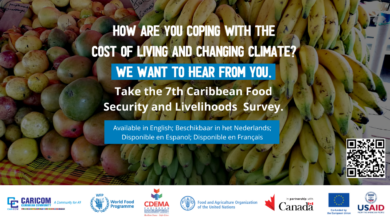(CARICOM Secretariat, Turkeyen, Greater Georgetown, Guyana) As the Caribbean Community (CARICOM) continues to advance its food security agenda in the face of high food prices, Member States will join their Latin American counterparts in Georgetown Thursday primarily to further strengthen governance arrangements for food security at the regional and global levels.
The Community, regional organizations and civil society will participate in the Hunger Free Latin America and the Caribbean Initiative Working Group Meeting at the Guyana International Conference Centre in Georgetown 12-14 July, 2012. The Meeting will address the steps taken at national and sub-regional levels to achieve food and nutrition security (FNS) in the region.
Hunger Free Latin America and the Caribbean Initiative is a commitment from countries and organizations in the region, supported by the United Nations Food and Agriculture Organization (FAO), to help create the conditions to eradicate hunger permanently by 2025. The Initiative was born during the Latin American Conference on Chronic Hunger, held in Guatemala in 2005, and has the ambitious, specific goal of reducing the incidence of chronic malnutrition in children below 2.5 per cent in all countries of the region by 2025.
The FAO, in 2009, established the Initiative as the strategic framework for all projects funded through the Spain-FAO Programme for Latin America and the Caribbean. This view was supported by the International Cooperation Fund Brazil-FAO since its formation in 2010.
Over the three days, participants will address the activities undertaken by the FAO in support of the Initiative; the new challenges and needs at national and sub-regional levels; and the role of regional integration organisations, the Initiative and the Committee on World Food Security.
The forum in Georgetown is the sixth Working Group meeting held annually since 2006, and is the first such meeting to be held in a CARICOM Member State.
That this meeting is being held in Georgetown is significant, given that Guyana holds the Agriculture portfolio in the Regional Quasi cabinet. It was in Georgetown that CARICOM Heads of Government, in 2009, signed the Liliendaal Declaration on Agriculture and Food Security in recognition of the critical, multi-functional role that agriculture plays in regional development.
That Declaration prioritized regional action in agriculture, with focus being placed on a CARICOM Agriculture Policy and Regional Strategic Plan. It speaks particularly to food and nutrition security in the context of the 2007/2008 food crisis which highlighted the urgent need to maximize Regional agricultural production to meet food security and nutrition needs; address poverty alleviation as well as income and employment generation; and ultimately the Region’s need to ensure that agriculture is recognised as a real generator of wealth.
The importance of effective agriculture health and food safety systems and sanitary and phyto-sanitary measures to food and nutrition security were also recognized in the Declaration.
In addition to the Liliendaal Declaration, the Community also has in place a policy on food and nutrition security and action plan. The CARICOM Regional Policy on Food and Nutrition Security, endorsed in October 2010 at a special Meeting of the Council for Trade and Economic Development (COTED) in Grenada, is grounded in commitments made by Member States in adhering to the Rights to Food Convention and the World Food Summit, 2009. Among the commitments the Community holds itself to are:
• direct action to immediately tackle hunger for the most vulnerable;
• medium to long-term sustainable agricultural, food security, nutrition and rural development programmes to eliminate the root causes of hunger and poverty, including through the progressive realization of the right to adequate food.
The Policy will also assist CARICOM Member States to achieve Goal 1 of the Millennium Development Goals (MDGs) – the reduction of the proportion and absolute numbers of people who suffer from hunger and malnutrition by half by 2015 and to measure the progress towards this achievement.
The Community will share with fellow participants at the Hunger-Free Initiative Latin America and Caribbean Initiative Forum, the progress made so far in these and other critical areas of food and nutrition governance in the Region.





